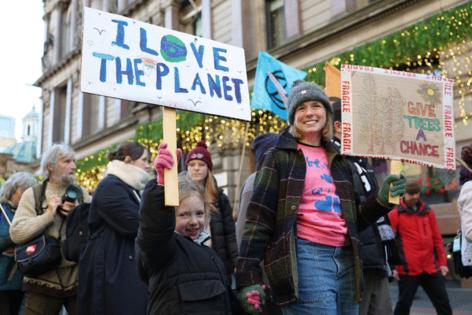Commentary: US rejection of climate science is a call to action for the rest of the world
Published in Op Eds
If there was any doubt that the current U.S. administration is the world’s greatest threat to action on climate change, President Donald Trump removed it on Sept. 23 when he addressed the U.N. General Assembly and called climate change “the greatest con job ever perpetrated on the world” and a threat promoted by “stupid people.”
He went on to ridicule Europe for reducing its carbon footprint by 37% and to extol the virtues of “clean, beautiful coal.” That’s pretty clear cut, as is the threat of climate change.
So, the question looms: What are the vast majority of nations that recognize the threat of climate change going to do? Unfortunately, so far the answer turns out to be “very little,” but the international community could do something, and soon.
Those same nations that assembled at the U.N. have a weapon at their disposal that could bring the U.S. back into the fold, a weapon that has been enthusiastically endorsed by Trump, one that could be deployed rapidly and would be simple to administer.
Before getting to that, a little background. Earlier in 2025, the International Maritime Organization, a U.N. agency, took a tentative step in the direction of global action on climate change by proposing a fee on fossil fuel emissions from ships involved in global trade, a proposal the organization was supposed to formally adopt this fall. Even this timid step — shipping accounts for only 1.4% of greenhouse gas emissions — provoked immediate threats from the Trump administration to impose tariffs or otherwise sanction nations that signed on.
The threats worked— the fractious meeting ended with the vote postponed for a year — but, with political will from the world’s nations, there’s an easy way to counter these threats and make a meaningful reduction in global emissions.
Forget about piecemeal actions. The international community could agree to a universal tariff that would be imposed on those nations that fail to reduce their annual emissions by a specified amount (3% annually is smaller than is needed to prevent a rise of 2 degrees Celsius from pre-industrial levels, but probably as large a reduction as the international community would accept). The Trump administration’s divide-and-conquer bluster would not work on an internationally agreed upon tariff; he can’t impose sanctions on the entire global community, or if he did, the pain would largely be felt by the U.S. itself.
Several agencies and institutions monitor each nation’s emissions, and the tariffs could be administered by the World Trade Organization, which has already declared that climate change is an issue it must address. Money collected could help poor nations achieve reductions. Such a tariff would represent action at the scale needed. It would be simple to administer, and it wouldn’t involve the endless, complex negotiations that have neutered every previous climate change initiative and are vulnerable to gaming.
A universal tariff is a low-hanging fruit on the climate action tree, and the Trump administration’s middle finger to the General Assembly could be a needed call to action as the world continues to sleepwalk into a climate disaster. Keeping temperatures from rising more than 1.5 degrees Celsius, the first danger point specified by the Paris Agreement, is basically a lost cause. The world will see a continued rise in economic and social damages inflicted by extreme storms, droughts, floods, temperatures and wildfires. It might still be possible, however, to prevent the rise in such events from continuing to accelerate.
One step toward slowing climate change would be recognizing that reducing global emissions represents an opportunity for the greatest economic stimulus program of all time as the world shifts its energy base away from fossil fuels and adjusts development and infrastructure priorities to climate realities.
Another step would be recognizing that no global climate action will be possible without playing hardball with the Trump administration, simply because any climate action will be nullified if the world’s largest economy uses its might to counter those efforts.
While Trump might believe he delivered a triumphant and dominant message to the world leaders gathered at the U.N., the messages received were very different. One of the loudest was that the U.S. government is going to do everything it can to hasten a climate disaster. If that doesn’t galvanize the international community, nothing will, and the world will continue to hurtle toward its appointment with climate destiny.
____
Eugene Linden is the author of “Fire & Flood: A People’s History of Climate Change From 1979 to the Present.”
_____
©2025 Los Angeles Times. Visit at latimes.com. Distributed by Tribune Content Agency, LLC.
























































Comments